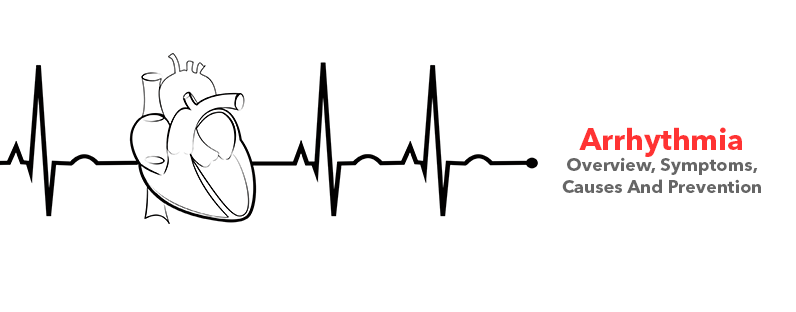Arrhythmia- Overview, Symptoms, Causes and Prevention
Overview
An arrhythmia is a problem with heartbeat rates or rhythms. The heart can beat too quickly, too slowly or at an abnormal rhythm during an arrhythmia. The condition is called tachycardia when a heart beats too fast. The condition is called bradycardia when a heart beats too slowly.
Arrhythmia is caused by changes in heart tissue and activity, or electrical signals regulating the heartbeat. Such changes can be caused by disease, injury or genetic damage. There are often no symptoms but some people feel a heartbeat that is irregular. You may feel faint or dizzy, or have trouble breathing.
The most common test used to diagnose an arrhythmia is an electrocardiogram (EKG or ECG). Your doctor will run other tests as needed. She or he may recommend medicines, placement of a device that can correct an irregular heartbeat or surgery to repair nerves that are over-stimulating the heart. If an arrhythmia is left untreated, the heart may not be able to pump enough blood to the body. This can damage the heart, the brain, or other organs.
Symptoms
Arrhythmias may not cause any signs or symptoms. In fact, during a routine exam, your doctor might find you have an arrhythmia before you do so. However, visible signs and symptoms don’t necessarily mean you have a severe problem.
Noticeable arrhythmia symptoms may include:
- A fluttering in your chest
- A racing heartbeat (tachycardia)
- A slow heartbeat (bradycardia)
- Chest pain
- Shortness of breath
Other symptoms may include:
- Anxiety
- Fatigue
- Lightheadedness or dizziness
- Sweating
- Fainting (syncope) or near fainting
When to call your doctor
The symptoms of arrhythmias are too often ignored. If you have symptoms of arrhythmias you should always consult your doctor. Some symptoms signal a need for immediate care. Additionally, some symptoms may be caused by other problems that require an urgent diagnosis.
Causes
Any interruption of the electrical impulses that cause contractions in the heart can lead to arrhythmia.
Some factors may cause the heart to function incorrectly, including:
- Alcohol abuse
- Diabetes
- Substance use disorder
- Drinking too much coffee
- Heart disease, such as congestive heart failure
- High blood pressure
- Hyperthyroidism, or an overactive thyroid gland
- Stress
- Scarring of the heart, mostly because of a heart attack
- Smoking
- Certain dietary and herbal supplements
- Some medications
- Structural changes in the heart
A person with good heart health will hardly ever experience long-term arrhythmia unless they have an external trigger, like as a disorder with substance use or an electrical shock.
An underlying heart condition, however, may mean that electrical impulses do not pass right through the heart. This increases the risk of developing arrhythmia.
Risk factors
The following may increase the risk of arrhythmia for a person:
- Being 65 years of age or older
- Inherited genetic anomalies
- Underlying heart problems
- Hypothyroidism or hyperthyroidism
- Some prescription medications and over-the-counter drugs
- Hypertension
- Obesity
- Uncontrolled diabetes
- Obstructive sleep apnea
- Electrolyte imbalances
- Heavy and regular alcohol consumption
- Too much caffeine
- Illegal drugs
Complications
Unrecognized or left untreated arrhythmias may often cause life-threatening problems affecting the heart and brain.
- Cognitive impairment and dementia: Alzheimer’s disease and vascular dementia are more common in people suffering from arrhythmia.
- Heart failure: Repeat arrhythmias can lead to a rapid decline in the ability of the lower chambers to pump blood. Heart failure is especially likely to develop or to grow worse as a result of arrhythmia when you already have heart disease.
- Stroke: This can occur in some patients who have atrial fibrillation. Blood can pool in the atria with arrhythmia, causing blood clots to form. If a clot breaks off and travels to the brain, it can cause a stroke.
- Sudden cardiac arrest: Because of ventricular fibrillation, the heart will suddenly and unexpectedly stop beating.
- Sudden infant death syndrome (SIDS): SIDS can be attributed to an inherited conduction disorder that causes arrhythmia.
- Worsening arrhythmia: Some arrhythmias trigger another type of arrhythmia or get worse over time.
Prevention
It is necessary to live a healthy lifestyle to reduce heart disease to prevent the risk of heart arrhythmia. A heart-healthy lifestyle may include:
- Eating a heart-healthy diet
- Staying physically active and keeping a healthy weight
- Avoiding smoking
- Limiting or avoiding caffeine and alcohol
- Use cautious over-the-counter medicines, as some cold and cough medicines contain stimulants that can cause a rapid heartbeat
- Reducing stress, because intense stress and anger can cause problems with heart rhythm
